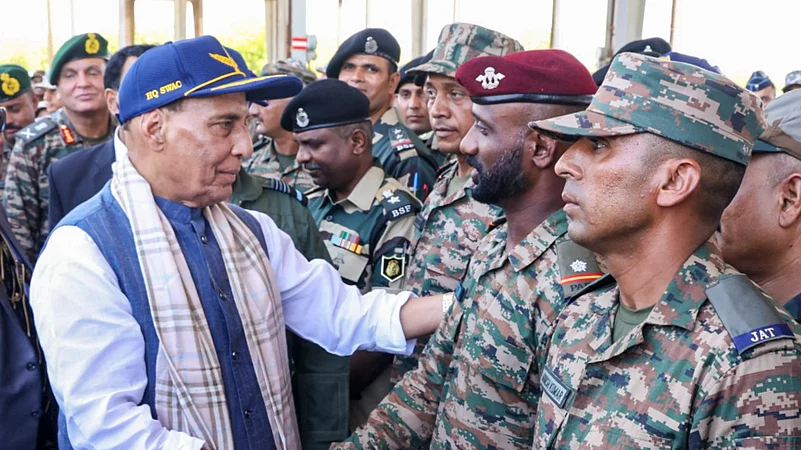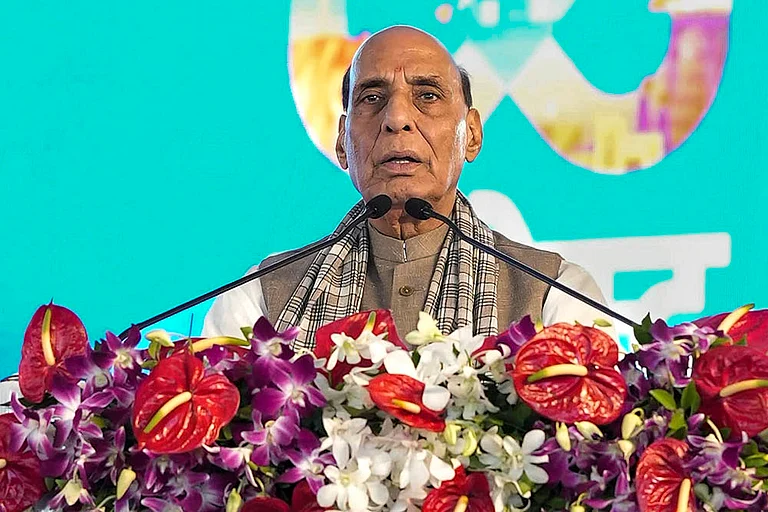
Defence Minister Rajnath Singh cautioned Pakistan that any move in the Sir Creek region would be met with a response strong enough to change “history and geography.”
Highlighting Operation Sindoor, he said Indian forces exposed Pakistan’s air defence and achieved all objectives without escalating to war.
Singh stressed the unity of India’s armed forces and said weapons are viewed as instruments of righteousness, not mere displays of power.
Defence Minister Rajnath Singh on Thursday issued a warning to Pakistan, saying any attempt at aggression in the Sir Creek region would invite a “resounding response” that could alter “history and geography.”
Speaking at a military base near Bhuj in Gujarat, where he marked Dussehra with soldiers and performed the traditional shastra puja (worship of weapons), Singh underscored India’s preparedness to defend its borders.
"Any aggression by Pakistan in the Sir Creek area will be met with a resounding response that will change both history and geography. In the 1965 war, the Indian Army had demonstrated the capability to reach Lahore. Today in 2025, Pakistan should remember that one route to Karachi passes through the creek," he said.
The 96-km-long Sir Creek, a tidal estuary between Gujarat’s Rann of Kutch and Pakistan, has long been a disputed region due to differing interpretations of maritime boundaries. Singh accused Pakistan of pursuing “flawed and unclear” intentions, pointing to its “recent expansion of military infrastructure” near the creek.
"Despite 78 years of independence, the border dispute continues in the Sir Creek area. India has repeatedly attempted to resolve this issue through dialogue, but Pakistan's intentions are flawed and unclear," he said.
On Operation Sindoor—launched in May in response to the Pahalgam terror attack—Singh said India had met all its objectives without escalating to full-scale war.
"During Operation Sindoor, Pakistan made an unsuccessful attempt to penetrate India's defence system from Leh to Sir Creek. However, in retaliatory action, Indian forces completely exposed the Pakistani air defence system and sent a message to the world that Indian forces can inflict heavy losses on Pakistan whenever and wherever they wish," he said.
The operation, conducted from May 7 to 10, targeted nine terrorist infrastructure in Pakistan-controlled territories and ended after four days of military clashes. Singh stressed that India’s actions were directed at terrorism, not war.
"Escalating it and starting a war was not the objective of Operation Sindoor. I am happy that Indian forces have successfully achieved all the military objectives of Operation Sindoor. But our fight against terrorism continues," he said.
Singh credited the joint effort of the Army, Air Force and Navy for the operation’s success.
"It was the jointness of our armed forces that executed Operation Sindoor in record time. On this occasion today, I also want to extend special congratulations to our brave soldiers and officers for the success of Operation Sindoor," he said.
"Your strategy, your courage and your capability have proven that India is capable of defeating the enemy in every situation. I am fully confident that the courage of all of you, the valour of all of you, will continue to protect India's sovereignty and integrity," he added.
Calling the three services the “three pillars” of national security, Singh said their synergy was vital to meeting challenges.
"When these three services work together, only then can we effectively face every challenge," he said.
The defence minister, who has observed shastra puja on Dussehra for years, emphasized that India views weapons not as symbols of power, but as instruments of righteousness.
"For us, weapons are not just tools. Weapons are not merely for displaying power. Rather, we believe that weapons are a means to establish righteousness," he said.
(with PTI inputs)





























